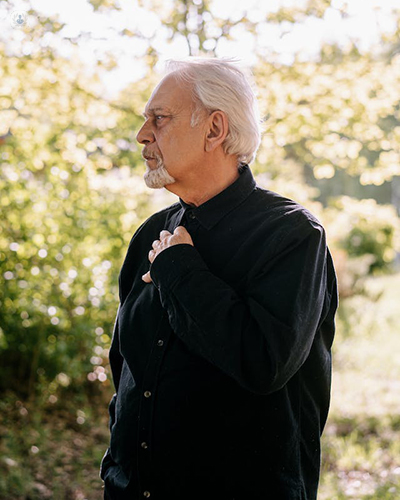Establishing and treating the causes of cardiac chest pain: the interventional cardiologist's point of view
Written by:Chest pain is a symptom which often raises concerns and prompts people to seek medical attention. While it can be attributed to various causes, it's crucial to recognise that not all chest pain is a sign of a heart problem. However, when it comes to matters of the heart, timely intervention is paramount. In this article, we hear specialist insight from revered consultant interventional cardiologist Dr Giovanni Luigi De Maria on how cardiac causes of chest pain can be diagnosed and the available treatment options.

What does chest pain feel like?
Chest pain can manifest in different ways, ranging from a dull ache to a sharp, stabbing sensation. It's essential to pay attention to associated symptoms, such as shortness of breath, nausea, or sweating. These could be signs of a heart-related issue. However, chest pain can also stem from gastrointestinal problems, muscle strain, or respiratory issues.
Cardiac chest pain is typically related with a mismatch between oxygen demand and oxygen supply to the heart. Narrowing in the vessels supplying the heart or a dysfunction of the small capillaries of the heart (aka microvascular dysfunction) are the most common mechanisms responsible of such mismatch.
Most commonly cardiac-related chest pain is associated with or triggered by some forms of physical activities or intense emotional stressors. Though occurrence is possible also in resting conditions, hence it is usually wise to not underestimate it.
How do interventional cardiology specialists work to establish the cause of chest pain?
Careful consultation and history taking combined with initial non-invasive assessments of the heart-blood-supply represent the first step when investigating the source of chest pain.
Interventional cardiology plays a crucial role in uncovering and treating the mechanism of chest pain, especially when a cardiac cause is highly likely. This subspecialty involves minimally invasive procedures to diagnose and treat cardiovascular conditions. One such procedure is the invasive coronary angiogram, typically performed under local anaesthesia and sedation, from the wrist. The test allows to explore the status of the major vessels supplying the heart (coronary arteries), but also to check on the status of the small capillaries of the heart via so called coronary physiology tests.
In case of documented restrictions in the major vessels of the heart, the procedure can be completed, even within the same setting if technically feasible, with coronary angioplasty.
What is a coronary angioplasty?
In layman's terms, coronary angioplasty acts like a highway maintenance team fixing a blocked road. A small balloon is inflated in the narrowed artery, widening it to restore proper blood flow. In some cases, a stent, a mesh-like device, is placed to keep the artery open, preventing future blockages.
Why is it important to seek medical advice promptly when experiencing chest pain?
In matters concerning the heart, time is of the essence. If chest pain is suspected to be cardiac in nature, seeking medical attention promptly is crucial.
Can the causes of chest pain be prevented?
Interventional cardiologists not only treat acute conditions but also contribute significantly to preventive cardiology. By educating patients about lifestyle modifications, managing risk factors such as hypertension and high cholesterol, and encouraging regular exercise, they aim to prevent future cardiac events.
If you are concerned about your heart health or are experiencing recurrent chest pain, visit Dr Giovanni Luigi De Maria’s Top Doctors profile to schedule a consultation.


